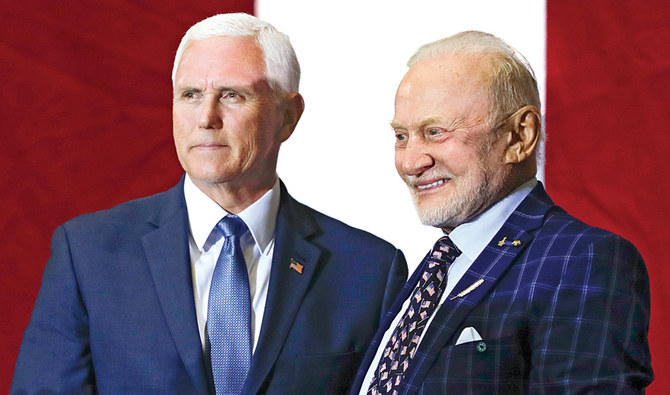VATICAN CITY: Pope Francis hopes that the 50th anniversary of the first moon walk inspires efforts to help our “common home” on Earth.
Francis told the public in St. Peter’s Square on Sunday, the day after the anniversary of the July 20, 1969, lunar landing, that the feat achieved an “extraordinary dream.”
He expressed hope that the memory of “that great step for humanity” would spark the desire for progress on other fronts: “More dignity for the weak, more justice among people, more future for our common home.”
The pope’s remarks came as US Vice President Mike Pence marked the 50th anniversary of humanity’s first moon landing at the Apollo 11 launch site.
Moonwalker Buzz Aldrin accompanied Pence to Florida’s Kennedy Space Center in the US and showed him the pad where he began that momentous journey 50 years ago. Aldrin later got a standing ovation during a speech by Pence.
Mission commander Neil Armstrong, the first man to step onto the moon on July 20, 1969, died seven years ago. Command module pilot Michael Collins did not attend the Florida celebration.
Pence says Apollo 11 is the only event of the 20th century that “stands a chance of being widely remembered in the 30th century.”
The vice president reiterated the Trump administration’s push to put Americans back on the moon by 2024.
BACKGROUND
Mission commander Neil Armstrong, the first man to step onto the moon on July 20, 1969, died seven years ago. Command module pilot Michael Collins did not attend the Florida celebration.
India is bidding to become just the fourth nation — after Russia, the US and China — to land a spacecraft on the moon.
India will make a second attempt on Monday to send a landmark spacecraft to the moon after an apparent fuel leak forced last week’s launch to be aborted.
The fresh launch attempt for Chandrayaan-2 — Moon Chariot 2 in some Indian languages including Sanskrit and Hindi — has been scheduled for 2:43 p.m. (0913 GMT) on Monday, the Indian Space Research Organization said.
“Chandrayaan 2 is ready to take a billion dreams to the Moon — now stronger than ever before!” it said on Thursday.
Chandrayaan-2 will be launched atop a Geosynchronous Satellite Launch Vehicle (GSLV) MkIII, India’s most powerful rocket.
Experts said setbacks were to be expected in such missions given their complexity, and that it was more prudent to delay the launch instead of taking risks that may jeopardize the project.


























